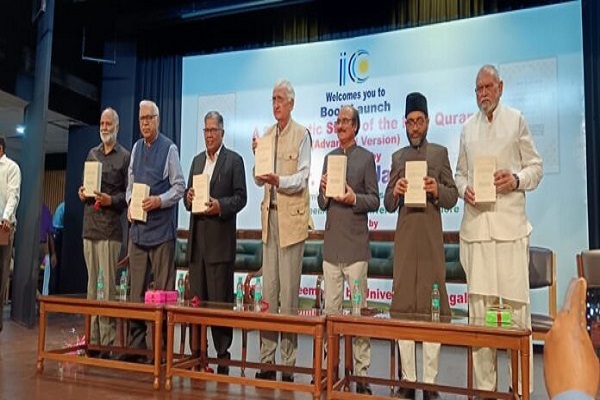AhlulBayt News Agency (ABNA): The new edition of “A Systematic Study of the Holy Quran” was unveiled at a ceremony in New Delhi, India this weekend.
A number of intellectuals, scholars, and book enthusiasts marked the grand launch of the book, authored by the esteemed scholar Dr. Javed Jamil.
The event, held at the India Islamic Cultural Centre (IICC) on Sunday, showcased the author’s deep dedication to exploring and understanding the teachings of the Quran through a structured and analytical approach, aiming to bridge classical Quranic scholarship with contemporary issues. The Sunday event was a relaunching ceremony of an updated edition. Its old version was earlier launched in 2020.
Dr. Javed Jamil, a renowned Islamic scholar and Chair Professor at Yenepoya University, Mangalore introduced his latest work as an effort to offer readers a profound and systematic examination of the Quran’s teachings, emphasizing its relevance in modern life. “A Systematic Study of the Holy Quran” is intended as both a reference guide and a comprehensive analysis for scholars, students, and anyone interested in the Quran’s socio-scientific perspective. Dr. Jamil explained that the book offers an in-depth understanding of the Quran’s message, covering its moral, spiritual, and scientific dimensions.
The launch event featured prominent speakers from diverse backgrounds, including religious scholars, professors, and thought leaders, who commended Dr. Jamil’s unique approach to Quranic study. Many emphasized the timeliness of the book, noting its potential to foster an inclusive dialogue that transcends religious boundaries and inspires constructive discourse.
Syed Sadatullah Husaini, Ameer (President) of Jamaat-e-Islami Hind, congratulated the author and praised his efforts in producing such a remarkable work. In his address to the gathering, Syed Sadatullah highlighted three key features of the book: first, the integration of scientific knowledge to deepen understanding of the Holy Quran; second, the application of Quranic insights to address contemporary issues like social, economic, and health matters; and third, the emphasis on Quranic teachings to counteract the ignorance of modern times.
Maulana Faisal Rahmani, Ameer-e-Shariat of Bihar, Jharkhand, Orissa, and West Bengal, highlighted the book’s deep insights into various facets of Kalaam-e-Ilahi, elaborating on its structured chapters and unique perspectives.
Dr. Zafarul Islam Khan, former Chairman of the Delhi Minorities Commission and currently, the president of All India Muslim Majlis-e-Mushawarat stressed the need for analytical studies of the Quran at universities in India and globally. He stated that the author introduces a new horizon for the systematic study of the Quran in academia. Dr Khan proposed incorporating Applied Islamics into Islamic Studies programs, recognizing the book as a valuable resource for both Muslims and non-Muslims seeking insights into life’s purpose and humanity’s role on earth.
Former Chief Election Commissioner S.Y. Qureshi, author of The Population Myth: Islam, Family Planning, and Politics, underscored the importance of continuous Quranic studies and expressed his aspiration to write about Islam’s relationship with environmental issues.
K Rahman Khan, former Union Minister of Minority Affairs and also Ex-Deputy Chairman of Rajya Sabha, endorsed Dr. Jamil’s work as essential reading, appreciating its analytical approach and guidance.
Presiding over the event, former Indian foreign Minister Salman Khurshid emphasized the book’s relevance in today’s world, noting its critique of modern systems while boldly defending Islamic perspectives.
In his inaugural speech, Professor Jalal Umar introduced the author, noting, “Dr. Jamil has adopted an unprecedented approach in presenting the Holy Quran as a source not only of spiritual guidance but also of practical insights for addressing social and scientific challenges.”
The program, led by Prof. Khalid Mubashshir, reflected a shared appreciation for Dr. Jamil’s work as a valuable guide for understanding and applying Quranic teachings.
....................
End/ 257

